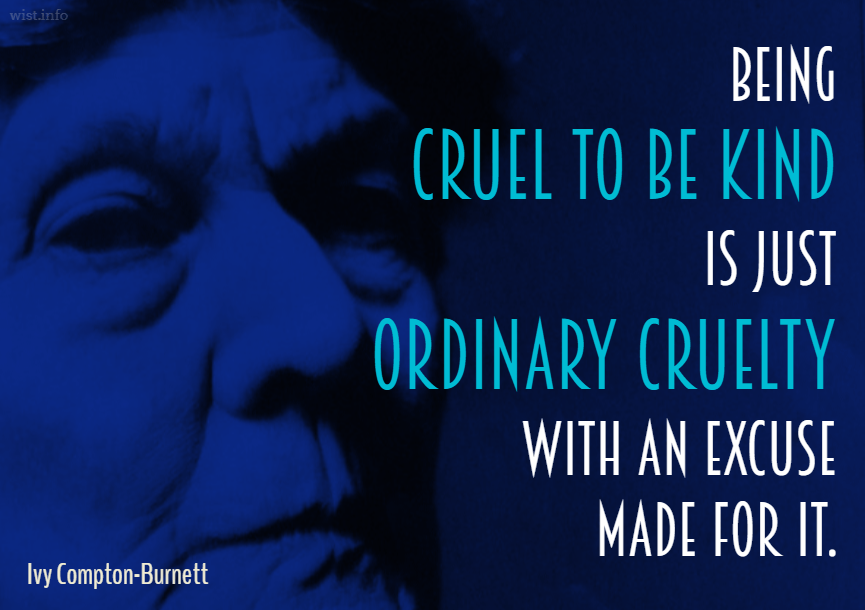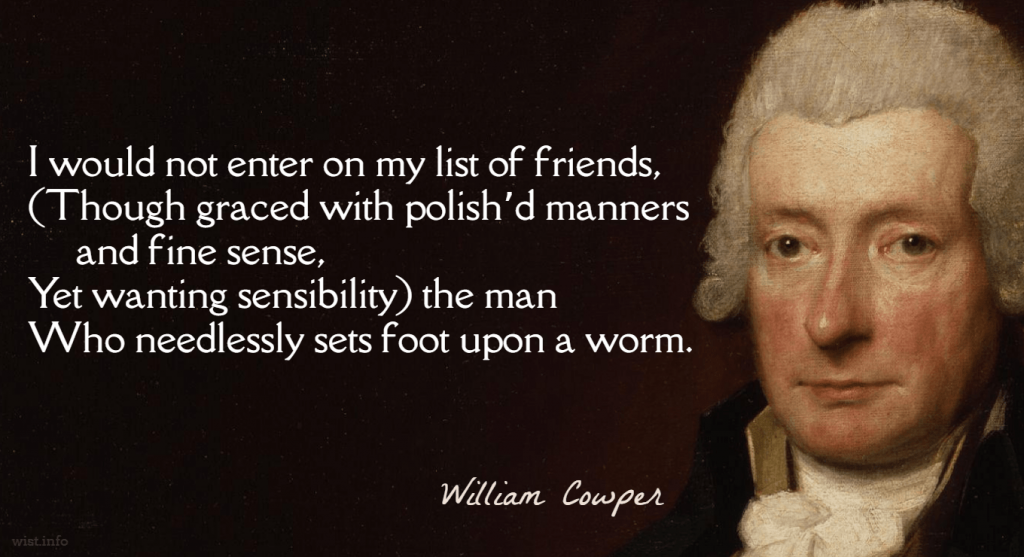Cruel and savage as orthodoxies have always proved to be, the faithful seem able to convince themselves that the heretics, as they continue to crop up, get nothing worse than their due, and to rest with an easy conscience.
Learned Hand (1872-1961) American jurist
Speech (1955-01-29), “A Fanfare for Prometheus,” American Jewish Committee annual dinner, New York City
(Source)
Quotations about:
cruelty
Note not all quotations have been tagged, so Search may find additional quotes on this topic.
We are afraid of having and showing a small mind, and we are not afraid of having and showing a small heart.
Joseph Joubert (1754-1824) French moralist, philosopher, essayist, poet
Pensées [Thoughts], 1805 entry [tr. Auster (1983)]
(Source)
I could not find an analog in other translations of the Pensées.
GLOUCESTER: As flies to wanton boys are we to th’ gods;
They kill us for their sport.William Shakespeare (1564-1616) English dramatist and poet
King Lear, Act 4, sc. 1, l. 41ff (4.1.41-42) (1606)
(Source)
It is the certainty that they possess the truth that makes men cruel.
[C’est la certitude qu’ils tiennent la vérité qui rend les hommes cruels.]
Anatole France (1844-1924) French poet, journalist, novelist, Nobel Laureate [pseud. of Jaques-Anatole-François Thibault]
(Misquotation)
Widely attributed (in French and English) to Anatole France, but not found in his works, including the one location it is sometimes cited from, Les Dieux Ont Soif [The Gods Are Thirsty, The Gods Are Athirst, The Gods Will Have Blood] (1912), in either English translation or, more importantly, in the original French.
While thematically keeping in the novel's depiction of the French Revolution and the Terror, the closest match to the quote I can find is this portion of ch. 22, talking about the expediting of the trials of those charged with counter-revolutionary crimes, eliminating the need to prove a misdeed by simply inquiring as to the accused's beliefs.
Justice thus abbreviated satisfied them; the pace was quickened, and no obstacles were left to fret them. They limited themselves to an inquiry into the opinions of the accused, not conceiving it possible that anyone could think differently from themselves except in pure perversity. Believing themselves the exclusive possessors of truth, wisdom, the quintessence of good, they attributed to their opponents noting but error and evil. They felt themselves all-powerful; they envisaged God.
[tr. Allinson (1913), Jackson (1921)]
Justice, thus curtailed, satisfied them; the pace was quickened and no obstacles were left to confuse them. They confined themselves to inquiring into the opinions of the accused, not conceiving it possible that anyone, except from pure perversity, could think differently from themselves. Believing themselves to possess a monopoly of truth, wisdom and goodness, they attributed to their opponents all error, stupidity and evil. They felt themselves omnipotent: their eyes had seen God.
[tr. Davies (1979)]
La justice abrégée les contentait. Rien, dans sa marche accélérée, ne les troublait plus. Ils s’enquéraient seulement des opinions des accusés, ne concevant pas qu’on pût sans méchanceté penser autrement qu’eux. Comme ils croyaient posséder la vérité, la sagesse, le souverain bien, ils attribuaient à leurs adversaires l’erreur et le mal. Ils se sentaient forts : ils voyaient Dieu.
[Original]
Among the lessons taught by the French Revolution, there is none sadder or more striking than this — that you may make everything else out of the passions of men except a political system that will work, and that there is nothing so pitilessly and unconsciously cruel as sincerity formulated into dogma.
James Russell Lowell (1819-1891) American diplomat, essayist, poet
“Abraham Lincoln” (1864), My Study Windows (1871)
(Source)
My favorite word is “redemption.” I like both its meaning and the sound. My least favorite word is “maybe.” “Maybe” is almost always a “no” drawn out in cruel fashion.
Martha Elizabeth "Libba" Bray (b. 1964) American writer
“Twenty-One Things You Don’t Know About Me,” No. 4
(Source)
In her Amazon.com author biography.
A certain combination of incompetence and indifference can cause almost as much suffering as the most acute malevolence.
Bruce Catton (1899-1978) American historian and journalist
A Stillness at Appomattox (1953)
(Source)
Regarding prison camps during the US Civil War.
Crowley had always known that he would be around when the world ended, because he was immortal and wouldn’t have any alternative. But he hoped it was a long way off.
Because he rather liked people.
It was major failing in a demon. Oh, he did his best to make their short lives miserable, because that was his job, but nothing he could think up was half as bad as the stuff they thought up themselves. They seemed to have a talent for it. It was built into the design, somehow. They were born into a world that was against them in a thousand little ways, and then devoted most of their energies to making it worse. Over the years Crowley had found it increasingly difficult to find anything demonic to do which showed up against the natural background of generalized nastiness. There had been times, over the past millennium, when he’d felt like sending a message back Below saying, Look we may as well give up right now, we might as well shut down Dis and Pandemonium and everywhere and move up here, there’s nothing we can do to them that they don’t do to themselves and they do things we’ve never even thought of, often involving electrodes. They’ve got what we lack. They’ve got imagination. And electricity, of course.
One of them had written it, hadn’t he … “Hell is empty, and all the devils are here.”
Terry Pratchett (1948-2015) English author
Good Omens, 2. “Eleven Years Ago” (1990) [with Neil Gaiman]
(Source)
Christ by his crucifixion demonstrated exactly what the assault of cruelty on the innocent means; and the subsequent services devised by the early church commemorated the beauty of the virtue that was slain and the beastliness shown by the slayer, and reiterated the warning that this was the kind of crime man was inherently likely to commit unless he watched himself. There could be no more proper medicine for the human disease. But the church has poured as much of the draft as possible down the drain by its attempts to account for the crucifixion of Christ as an atonement for the sins of man instead of a demonstration of them.
Rebecca West (1892-1983) British author, journalist, literary critic, travel writer [pseud. for Cicily Isabel Fairfield]
“Pleasure Be Your Guide,” The Nation, “Living Philosophies” series #10 (25 Feb 1939)
(Source)
Adapted into Clifton Fadiman, I Believe: The Personal Philosophies of Certain Eminent Men and Women of Our Time (1952).
Out of instinct for self-preservation, and logically enough, [the mind] asks, “If it is a good and holy thing to be punished, must it not also be a good and holy thing to punish?” It answers that it is; and our earth becomes the hell it is. Thus we human beings plant in ourselves the perennial blossom of cruelty — the conviction that if we hurt other people we are doing good to ourselves and to life in general.
Rebecca West (1892-1983) British author, journalist, literary critic, travel writer [pseud. for Cicily Isabel Fairfield]
“Pleasure Be Your Guide,” The Nation, “Living Philosophies” series #10 (25 Feb 1939)
(Source)
Adapted into Clifton Fadiman, I Believe: The Personal Philosophies of Certain Eminent Men and Women of Our Time (1952).
But indeed we need no further argument in favor of taking pleasure as a standard when we consider the only alternative that faces us. If we do not live for pleasure we shall soon find ourselves living for pain. If we do not regard as sacred our own joys and the joys of others, we open the door and let into life the ugliest attribute of the human race, which is cruelty.
Rebecca West (1892-1983) British author, journalist, literary critic, travel writer [pseud. for Cicily Isabel Fairfield]
“Pleasure Be Your Guide,” The Nation, “Living Philosophies” series #10 (25 Feb 1939)
(Source)
Adapted into Clifton Fadiman, I Believe: The Personal Philosophies of Certain Eminent Men and Women of Our Time (1952).
I don’t think we injye other people’s suffin’, Hinnissy. It isn’t acshally injyement. But we feel betther f’r it.
[I don’t think we enjoy other people’s suffering, Hennessy. It isn’t actually enjoyment. But we feel better for it.]
Finley Peter Dunne (1867-1936) American humorist and journalist
Observations by Mr. Dooley, “Enjoyment” (1902)
(Source)
Where does discipline end? Where does cruelty begin? Somewhere between these, thousands of children inhabit a voiceless hell.
[Où finit la correction? Où commence le martyre? Dans l’entre-deux, des milliers d’enfants peuplent un enfer qui ne fait pas de bruit.]
For nothing is more blamefull to a Knight,
That court’sie doth as well as armes professe,
However strong and fortunate in fight,
Then the reproch of pride and cruelnesse:
In vain he seeketh others to suppresse,
Who hath not learned himself first to subdue:
All flesh is frayle and full of ficklenesse,
Subject to fortunes chance, still chaunging new;
What haps to-day to me to-morrow may to you.Edmund Spenser (c. 1552-1599) English poet
The Faerie Queene, Book 6, canto 1, st. 41 (1590-96)
(Source)
I’ve seen the meanness of humans till I don’t know why God ain’t put out the sun and gone away.
Cormac McCarthy (1933-2023) American novelist, playwright, screenwriter
Outer Dark, ch. 17 (1968)
(Source)
We call them dumb animals, and so they are, for they cannot tell us how they feel, but they do not suffer less because they have no words.
Anna Sewell (1820-1878) English novelist
Black Beauty, Part 4, ch. 36 “Jakes and the Lady” (1877)
(Source)
There lies at the back of every creed something terrible and hard for which the worshipper may one day be required to suffer.
E. M. Forster (1879-1970) English novelist, essayist, critic, librettist [Edward Morgan Forster]
“What I Believe,” The Nation (16 Jul 1938)
(Source)
It can truly be said: Men are the devils of the earth, and the animals are the tormented souls.
[Man möchte wahrlich sagen: die Menschen sind die Teufel der Erde und die Tiere die geplagten Seelen]
Arthur Schopenhauer (1788-1860) German philosopher
Parerga and Paralipomena, Vol. 2, ch. 15 “On Religion [Ueber Religion], § 179 “The Christian System [Über das Christenthum]” (1851) [tr. Hollingdale (1970)]
(Source)
(Source (German)). Alternate translation:
One might say with truth, Mankind are the devils of the earth, and the animals the souls they torment.
[tr. Saunders (1890)]
Being cruel to be kind is just ordinary cruelty with an excuse made for it.
I would not enter on my list of friends,
(Though graced with polish’d manners and fine sense,
Yet wanting sensibility) the man
Who needlessly sets foot upon a worm.William Cowper (1731-1800) English poet
“Winter Walk at Noon,” l. 560ff, The Task, Book 6 (1785)
(Source)
Love would put a new face on this weary old world in which we dwell as pagans and enemies too long.
Ralph Waldo Emerson (1803-1882) American essayist, lecturer, poet
“Man the Reformer,” lecture, Boston (1841-01-25)
(Source)
The greatest evil which fortune can inflict on men is to endow them with small talents and great ambition.
Luc de Clapiers, Marquis de Vauvenargues (1715-1747) French moralist, essayist, soldier
Reflections and Maxims [Réflexions et maximes], #562 [tr. Stevens] (1746)
(Source)
And, when you, looking on your fellow men
Behold them doomed to endless misery,
How can you talk of joy and rapture then?
May God withhold such cruel joy from me!Anne Brontë (1820-1849) British novelist, poet [pseud. Acton Bell]
“A Word to Calvinists” (28 May 1843)
(Source)
I love animals. Growing up, the two things that made my blood boil were religious intolerance and animal cruelty. I’ve never understood it. I can’t stand to have an animal in pain. I’ve got to get it out of my head. It makes me angry, I want to cry, I want to stab someone. I don’t know where that comes from, really.
Ricky Gervais (b. 1961) English comedian, actor, director, writer
Interview with Chris Heath, GQ (15 May 2013)
(Source)
It’s important to be kind. You can’t know all the times that you’ve hurt people in tiny, significant ways. It’s easy to be cruel without meaning to be. There’s nothing you can do about that. But you can choose to be kind. Be kind.
There is no occasion to trample upon the meanest reptile, nor to sneak to the greatest prince. Insolence and baseness are equally unmanly.
James Burgh (1714-1775) British politician and writer
The Dignity of Human Nature, Sec. 5 “Miscellaneous Thoughts on Prudence in Conversation” (1754)
(Source)
The curse of poverty has no justification in our age. It is socially as cruel and blind as the practice of cannibalism at the dawn of civilization, when men ate each other because they had not yet learned to take food from the soil or to consume the abundant animal life around them. The time has come for us to civilize ourselves by the total, direct and immediate abolition of poverty.
Martin Luther King, Jr. (1929-1968) American clergyman, civil rights leader, social activist, preacher
Where Do We Go From Here: Chaos or Community? ch. 5 “Where We Are Going?” (1967)
(Source)
Orthodoxy:
- In religion, that state of mind which congratulates itself on being absolutely right, and a belief that all who think otherwise are wholly wrong.
- A faith in the fixed — a worship of the static.
- The joy that comes from thinking that most everybody is lined up for Limbus with no return ticket.
- A condition brought about by the sprites of Humor, according to the rule that whom the gods would destroy they first make mad.
- The zenith of selfishness and the nadir of egotism.
- Mephisto with a lily in his hand.
- A corpse that does not know it is dead.
- Spiritual constipation.
- That peculiar condition where the patient can neither eliminate an old idea or absorb a new one.
Elbert Hubbard (1856-1915) American writer, businessman, philosopher
The Roycroft Dictionary (1914)
(Source)
We have enslaved the rest of the animal creation, and have treated our distant cousins in fur and feathers so badly that beyond doubt, if they were able to formulate a religion, they would depict the Devil in human form.
William Ralph Inge (1860-1954) English prelate [Dean Inge]
“The Idea of Progress,” Romanes Lecture (27 May 1920)
(Source)
“At this festive season of the year, Mr. Scrooge,” said the gentleman, taking up a pen, “it is more than usually desirable that we should make some slight provision for the Poor and Destitute, who suffer greatly at the present time. Many thousands are in want of common necessaries; hundreds of thousands are in want of common comforts, sir.”
“Are there no prisons?” asked Scrooge.
“Plenty of prisons,” said the gentleman, laying down the pen again.
“And the Union workhouses?” demanded Scrooge. “Are they still in operation?”
“They are. Still,” returned the gentleman, “I wish I could say they were not.”
“The Treadmill and the Poor Law are in full vigour, then?” said Scrooge.
“Both very busy, sir.”
“Oh! I was afraid, from what you said at first, that something had occurred to stop them in their useful course,” said Scrooge. “I’m very glad to hear it.”
“Under the impression that they scarcely furnish Christian cheer of mind or body to the multitude,” returned the gentleman, “a few of us are endeavouring to raise a fund to buy the Poor some meat and drink and means of warmth. We choose this time, because it is a time, of all others, when Want is keenly felt, and Abundance rejoices. What shall I put you down for?”
“Nothing!” Scrooge replied.
“You wish to be anonymous?”
“I wish to be left alone,” said Scrooge. “Since you ask me what I wish, gentlemen, that is my answer. I don’t make merry myself at Christmas and I can’t afford to make idle people merry. I help to support the establishments I have mentioned — they cost enough; and those who are badly off must go there.”
“Many can’t go there; and many would rather die.”
“If they would rather die,” said Scrooge, “they had better do it, and decrease the surplus population. Besides — excuse me — I don’t know that.”
“But you might know it,” observed the gentleman.
“It’s not my business,” Scrooge returned. “It’s enough for a man to understand his own business, and not to interfere with other people’s. Mine occupies me constantly. Good afternoon, gentlemen!”
Charles Dickens (1812-1870) English writer and social critic
A Christmas Carol, Stave 1 “Marley’s Ghost” (1843)
(Source)
He who is only just is cruel; who
Upon the earth would live were all judged justly?George Gordon, Lord Byron (1788-1824) English poet
Marino Faliero, Doge of Venice, Act 5, sc. 1 [Angiolina] (1821)
(Source)
The degree of civilization in a society can be judged by entering its prisons.
Fyodor Dostoyevsky (1821-1881) Russian novelist
(Attributed)
Sometimes cited to Dostoyevsky's The House of the Dead (1862) [tr. Garnett (1957)], which is a semi-autobiographical work about a Siberian prison camp, but the quotation cannot be found there.
See also Buck, Johnson.
As an atheist, I believe that all life is unspeakably precious, because it’s only here for a brief moment, a flare against the dark, and then it’s gone forever. No afterlives, no second chances, no backsies. So there can be nothing crueler than the abuse, destruction or wanton taking of a life. It is a crime no less than burning the Mona Lisa, for there is always just one of each.
So I cannot forgive. Which makes the notion of writing a character who CAN forgive momentarily attractive … because it allows me to explore in great detail something of which I am utterly incapable.
J. Michael (Joe) Straczynski (b. 1954) American screenwriter, producer, author [a/k/a "JMS"]
Usenet, rec.arts.sf.tv.babylon5, “JMS on Compuserve: Gesthemane Questions” (1995-12-04)
(Source)
A man of Cruelty is God’s enemy.
Thomas Fuller (1654-1734) English physician, preacher, aphorist, writer
Gnomologia: Adages and Proverbs, # 303 (1732)
(Source)
Is it necessary that Heaven should borrow its light from the glare of Hell? Infinite punishment is infinite cruelty, endless injustice, immortal meanness. To worship an eternal gaoler hardens, debases, and pollutes even the vilest soul. While there is one sad and breaking heart in the universe, no good being can be perfectly happy.
Robert Green Ingersoll (1833-1899) American lawyer, agnostic, orator
“The Great Infidels” (1881)
(Source)
There are many humorous things in the world, among them the white man’s notion that he is less savage than the other savages.
Mark Twain (1835-1910) American writer [pseud. of Samuel Clemens]
Following the Equator, ch. 21 (1897)
(Source)
He who is only just is cruel. Who on earth could live were all judged justly?
George Gordon, Lord Byron (1788-1824) English poet
Arino Faliero, Doge of Venice, Act 5, sc. 1 [Angiolina] (1820)
(Source)
Whenever people say “we mustn’t be sentimental,” you can take it they are about to do something cruel. And if they add, “we must be realistic,” they mean they are going to make money out of it.
Brigid Brophy (1929-1995) Anglo-Irish writer, novelist, playwright
Unlived Life





































